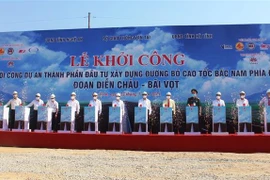Hanoi (VNA) - Law on Public-Private Partnership (PPP Law), which took effect on January 1, 2021, has created a legal framework for the implementation of transport infrastructure investment projects under the form of PPP.
North-South expressway projects in the form of PPP have witnessed positive changes with the capital contribution from the State. However, the success of a PPP project still depends on whether BOT investors can mobilize enough credit capital or not.
On May 6, the Ministry of Transport signed a BOT contract with investors and businesses to implement the Nha Trang-Cam Lam section with a total investment of about 5,524 billion VND. Of these, the capital mobilized by investors is about 2,556 billion VND and the capital contributed by the State is 2,967 billion VND.
On May 13, the project to build the Dien Chau-Bai Vot section with a total investment of 11,157 billion VND was also signed, in which capital mobilized by investors is about 5,090 billion VND and capital from the State is 6,067 billion VND.
Investors have a maximum period of 6 months for seeking credit capital from banks. In case investors cannot raise enough credit capital, the competent State agency will cancel the contract. Then the Ministry of Transport will request the National Assembly Standing Committee to consider and decide on the conversion of the investment method.
According to the Ministry of Transport, unlike BOT projects in the previous period, North-South expressway projects now have many specific mechanisms to limit risks for investors and credit institutions. For example, the site clearance work is carried out in advance with the State capital. The participation of State capital (accounting for 51% of total investment capital on average) has improved the financial efficiency significantly.
According to Director of the Public-Private Partnership Department Le Kim Thanh under the Ministry of Transport, the two above-said projects have corrected the shortcomings of previous BOT projects. For example, the toll rate is determined from the outset, and this will help reduce the risk for investors and credit providers.
“The successful organization of negotiations and signing of contracts, on the one hand, promotes socio-economic development and ensures national defense and security, and on the other hand, has great significance in implementing the policy of socializing traffic infrastructure investment, which has been facing many difficulties in recent times. This is also a positive signal for the PPP investment environment in the field of transport infrastructure in the 2021-2025 period, especially when the state budget is still difficult now,” the director said.
According to Deputy Minister of Transport Nguyen Nhat, in the past 5 years the ministry has not implemented any more BOT traffic projects, while in the 2011-2015 period, it had implemented 88 BOT projects. In particular, from 2019-2020, the ministry received 126 teams from the State Audit and inspection agencies. Through the inspection and audit conclusions, the ministry has drawn many lessons and experiences, identified difficulties and obstacles to implement BOT projects more methodically and ensure fairness between the State and investors.
Appreciating the investors and commercial banks who have participated in the BOT projects, a leader of the Ministry of Transport acknowledged that the PPP Law has created a legal framework for the implementation of infrastructure investment projects in the form of PPP, including three projects of sections Dien Chau-Bai Vot, Nha Trang-Cam Lam and Cam Lam-Vinh Hao.
“If banks accompany businesses, the projects will definitely succeed. Besides, investors and businesses should also study the issuance of corporate bonds to mobilize more investment capital in the transport sector," said the transport official.
 If banks support and accompany businesses, transport projects in the form of PPP will certainly succeed. (Photo: Viet Hung/Vietnam+)
If banks support and accompany businesses, transport projects in the form of PPP will certainly succeed. (Photo: Viet Hung/Vietnam+)The Ministry of Transport is urgently finalizing the pre-feasibility study report of the East North-South Expressway Construction project in the 2021-2025 period to submit to the competent authorities for approval.
Accordingly, in the next 5 years, the ministry will call for investment for the remaining 762km, including the sections of Ha Tinh-Quang Tri (267km), Quang Ngai-Nha Trang (353km) and Can Tho-Ca Mau (142km)./.



























